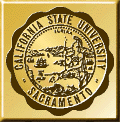
ANTH 157-
Syllabus
HUMAN VARIATION
Spring 2002
TuTh 3-4:15 PM SQU 450
California State University, Sacramento
Instructor: Dr. Gerrell Miles Drawhorn
Office: MND 4019
Phone: 278-4555 [or message 278-6452 or piltdown@saclink.csus.edu]
Office Hours: M 10-11 AM; Tu 1:30-2:30 PM ;or by appointment
|
|
|||
|
|
|
Catalog Description: A survey of the basic principles of human genetics with emphasis on the mechanisms that shape human evolution and the development of human races. Analysis of the laws of heredity as exhibited in modern human populations and human adaptability to climatic extremes. Historical development of concepts. Discussion of most current research.
Course Objectives
This course is intended to familiarize students with the basic concepts of human genetics and plasticity as applied to understanding human biological diversity. The student will become familiar with the basic methods used by human geneticists in tracing genetic traits in families and populations, and how that knowledge is applied in clinical and forensic settings. Topics will include the traditional concept of race and recent critiques of those models; geographic and clinal variation; biological adaptation to climate and disease; bio-social adaptations; variation within populations; heritability, and current issues that relate to genetic variation within our species.
ANTH 1; BIOS 10; or permission of instructor
Anthro 157 requires students have a good, current knowledge of basic evolutionary principles and terminology related to physical anthropology. It is necessary that students have taken Anthropology 1 or its equivalent within the last two years or be taking that course concurrently. Students who do not meet these requirements should discuss with the instructor supplementary materials to meet the demands of the class.
Students will be expected to complete the assigned readings by the assigned class dates in order to be prepared to answer questions and participate in class discussions. In addition there will be more formal written/activity assignments that will be turned in.
|
Assignment |
Points |
Date Due |
|
WORKSHEETS |
10 @ 4 % each
= 40 % Total |
|
|
MIDTERM EXAMS |
20 % each
= 40 % Total |
|
|
FINAL EXAM |
20 % |
Tuesday 5/21 ) |
WORKSHEETS/ASSIGNMENTS
Regular attendance and completion of assignments are critical to success in this class. Assignments will be handed out and discussed in class. Several assignments will require accessing an internet site and completing a project there. Assignments will be due (in class) on the date of the subsequent midterm. Assignments in the final section of the the course will be due on the last day of class (not the final exam date!).
EXAMINATIONS
There will be three exams (worth 20% each). Exams will consist of objective questions (T/F; Multiple Choice; Matching) and short (one paragraph) answers. Questions shall be drawn from both the primary text (Molnar) and the required readings in the supplementary text (Sussman). The first midterm will cover the history of concepts related to human variation; basic genetics; and traits of simple inheritance(Chapters 1-3 in Molnar). The second midterm will cover how traits of simple inheritance are distributed in human populations; polygenic traits and the processes and patterns of distribution in humans (Chapters 4-6 in Molnar). The Final Exam will deal with several social issues (IQ, Forensic, Athletic Ability, Sex and Gender Differences) and the impacts of changing environments (Chapters 7-8 in Molnar).
EXTRA CREDIT
Up to 10% of your final grade may be improved by undertaking extra credit projects/activities. These include attendance/reports on lectures; reviews of relevant TV broadcasts, or other activities as announced.
Grades
A Outstanding 90+
points B Excellent
performance; clearly exceeds course
requirements 80-89
points C Average 70-79
points D Passed, but not at
average achievement standards 60-70
points F Failure to meet
class requirement < 60
points Incompletes:
Student must see instructor prior to last exam to
request an incomplete due to illness.
Reading Materials
"Human Variation: Races, Types, and Ethnic Groups" by Stephen Molnar (Prentice Hall,NJ) Fifth Edition
"The Biological Basis of Human Behavior: A Critical Review" Robert W. Sussman (ed.) (Prentice-Hall, NJ). Second Edition.
You can purchase books through the Hornet Bookstore.
.
.
.
Schedule of Events
Week 1 Introduction; History of the Race Concept; Classification; Impact of the "New Synthesis"
(Molnar-Preface/Chap.1; Sussman Chaps. 1-2/27-28/34-35/37)
Week 2-3 Principles of Inheritance; The Gene at the DNA and Molecular Level; Human Polymorphisms (Molnar-Chap.2; Sussman Chap. 3; 59)
Week 4-5 Traits of Simple Inheritance: Blood Groups; Serum Proteins; Metabolic and other Human Polymorphisms (Molnar-Chap.3; Sussman Chap. 9-10)
Thursday 3/28 MIDTERM 1
Week 5-6 Traits of Simple Inheritance: Hemoglobin Variants and other adaptations to Malaria; Genetic Markers (Molnar-Chap.4)
Week 7-8 Traits of Complex Inheritance: Body Form, Pigmentation and Hair Form (Molnar-Chap.5)
Week 9 Spring Break/Cesar Chavez Day
Week 10-11 Distribution of Human Differences; Populations; Clines
(Molnar-Chap.6; Sussman Chap. 26, 29, 30, 49)
Thursday 4/11 MIDTERM 2
Week 12 Behavioral Variation: Intelligence and Athletic Performance; Heritability; Nature/Nuture (Molnar-Chap.7; Sussman Chap. 4, 31-33, 50, 58)
Week 13 Sex Differences: Hormonal Influences (Sussman 12; 40-42; 51-53; 56)
Week 14 Human Universals: Sociobiology and Evolutionary Psychology
(Sussman 13-15; 25, 38-39; 43-48; 55, 57)
Week 15 Human Evolution Today: Demographic and Disease Factors (Molnar-Chap.8; Sussman Chap 8, 36)
May 16 Final Assignment Sets Due
FINAL EXAM Tuesday 5/21 = 3-5 PM
.
Resources
The Physical Anthropology website (www.csus.edu/anth/physanth) has a number of resources that students in this course will find invaluable. Other useful links are the "Patterns of Human Variability" (www.as.ua.edu/ant/bindon/ant101/lectures/race) website, the "On-Line Mendelian Inheritance in Man" (www3.ncbi.nlm.nih.gov/omim) site, and the website for the PBS Series "Evolution" ( www.pbs.org/wgbh/evolution )
OVERVIEW / INSTRUCTOR /RESOURCES
DEPARTMENT / COLLEGE / CSUS
Page updated: January 26, 2002 1999